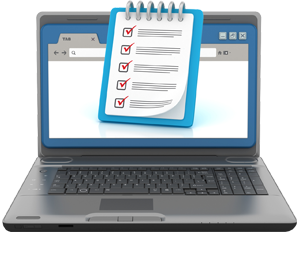Eight ideas to make filing your tax return easier
 Consider these suggestions for helping to make tax season smooth sailing this year for your small business:
Consider these suggestions for helping to make tax season smooth sailing this year for your small business:
- Make your estimated tax payments. Tuesday, January 18th is the due date to make your 4th quarter payment for the 2021 tax year. Now is also the time to create an initial estimate for first quarter 2022 tax payments. The due date for this payment is Monday, April 18.
- Reconcile your bank accounts. Preparing an accurate tax return starts with accurate books. Reconciling your bank accounts is the first step in this process. Consider it the cornerstone on which you build your financials and your tax return. Up-to-date cash accounts will also give you confidence that you’re not over-reporting (or under-reporting!) income on your tax return.
- Organize those nasty credit card statements. If you use credit cards for your business, develop an expense report for these expenditures, if you have not already done so. The report should recap the credit card bill and place the transactions in the correct expense accounts. Attach actual copies of the expenses in the credit card statement. You will need this to support any sales tax paid in case of an audit. Use this exercise to show you are only including business-related expenses by reimbursing your business for any personal use of the card.
- Reconcile accounts payable. One of the first tax deadlines for many businesses is issuing 1099 forms to vendors and contractors at the end of January. Get your accounts payable and cash disbursements up-to-date so you have an accurate account of which vendors you paid.
- Get your information reporting in order. Now identify anyone you paid during the year that will need a 1099. Look for vendors that are not incorporated like consultants or those in the gig economy and don’t forget your attorneys. You will need names, addresses, identification numbers (like Social Security numbers) and amounts billed. Send out W-9s as soon as possible to request missing information.
- File employee-related tax forms. If you have employees, file all necessary W-2 and W-3 forms, along with the applicable federal and state payroll returns (Forms 940 and 941). Do this as soon as possible in January to allow time to identify any potential problems.
- Compile a list of major purchases. Prepare a list of any purchases you made during 2021 that resulted in your business receiving an invoice for $2,500 or more. Once the list is compiled, find detailed invoices that support the purchase and create a fixed asset file. This spending will be needed to determine if you wish to depreciate the purchase over time, take advantage of bonus depreciation, or expense the purchase using code section 179. Your choices create a great tax planning tool.
- Review the impact of COVID-19. There are a number of federal and state initiatives that will need to be considered when filing your 2021 tax return. If you received payroll credits for employee retention or have a Paycheck Protection Program loan that needs to be accounted for this year, be prepared with the details. It will be important to correctly account for these funds.
Here are some ideas to lower your business taxes, get organized, and to prepare for filing your 2021 tax return.
 As 2021 winds down, here are some ideas to consider in order to help manage your small business and prepare for filing your upcoming tax return.
As 2021 winds down, here are some ideas to consider in order to help manage your small business and prepare for filing your upcoming tax return.
- Identify all vendors who require a 1099-MISC and a 1099-NEC. Obtain tax identification numbers (TIN) for each of these vendors.
- Determine if you qualify for the Paycheck Protection Program (PPP) safe harbor threshold that allows you to deduct certain 2020 expenses on your 2021 tax return.
- Consider accelerating income or deferring earnings, based on profit projections.
- Section 179, or bonus depreciation expensing versus traditional depreciation, is a great planning tool. If using Section 179, the qualified assets must be placed in service prior to year-end.
- Business meals are 100% deductible in 2021 if certain qualifications are met. Retain the necessary receipts and documentation that note when the meal took place, who attended and the business purpose of the meal on each receipt.
- Consider any last-minute deductible charitable giving including long-term capital gain stocks.
- Review your inventory for proper counts and remove obsolete or worthless products. Keep track of the obsolete and worthless amounts for a potential tax deduction.
- Set up separate business bank accounts. Co-mingling business and personal expenses in one account is not recommended.
- Create expense reports. Having expense reports with supporting invoices will help substantiate your tax deductions in the event of an audit.
- Organize your records by major categories of income, expenses and fixed assets purchased to make tax return filing easier.
- Review your receivables. Focus on collection activities and review your uncollectable accounts for possible write-offs.
- Make your 2021 fourth-quarter estimated tax payment by January 18, 2022.